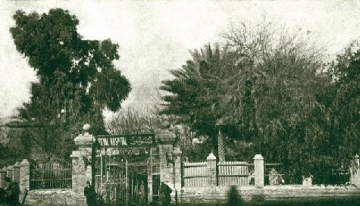The views expressed in our content reflect individual perspectives and do not represent the authoritative views of the Baha'i Faith.
If you live near any Baha’is, you may notice some celebrating today after sunset, when the Baha’i Festival of Ridvan begins.
The word Ridvan, pronounced “rez-van,” means “Paradise.” Baha’is celebrate for twelve days during the festival of paradise—so named because Baha’u’llah, the prophet and founder of the Baha’i Faith, first announced his prophetic claims as the latest messenger of God in a Baghdad garden he named Ridvan.
Baha’is celebrate the Ridvan Festival to commemorate the anniversary of that garden sojourn where Baha’u’llah declared his mission and inaugurated the Baha’i Faith, which happened outside Baghdad during the twelve days before his banishment to Istanbul (then called Constantinople) in 1863.
Ten years before, in 1853, the Persian government exiled Baha’u’llah from Tehran to Baghdad because it feared the rapid spread of his teachings and their progressive impact on society. In April of 1863, because the exile didn’t work—Baha’u’llah’s teachings continued to spread and threaten the clerics—the authorities banished him into further exile:
We desire but the good of the world and the happiness of the nations; yet they deem Us a stirrer up of strife and sedition worthy of bondage and banishment …. That all nations should become one in faith and all men as brothers; that the bonds of affection and unity between the sons of men should be strengthened; that diversity of religion should cease, and differences of race be annulled—what harm is there in this? – Baha’u’llah, The Proclamation of Baha’u’llah, p. viii.
During that fateful springtime, Baha’u’llah’s symbolic sojourn in the verdant Ridvan garden ensued after weeks of tragically sorrowful times for his friends, followers and family. Informed of the government’s order, which would remove Baha’u’llah from Baghdad and remove him from their midst forever, they mourned and lamented, crowding in and around his house in large numbers. Deeply worried about his eventual fate because the same government had executed his predecessor and herald The Bab, Baha’u’llah’s followers viewed his upcoming departure with great trepidation.
But in the midst of all that fear and sadness, Baha’u’llah proclaimed the mission of his new Faith—and that profound announcement transformed the occasion of his banishment from tragedy to triumph.
So today Baha’i communities and their friends around the world commemorate the eve of Baha’u’llah’s banishment from Baghdad to Istanbul, not as a time of sorrow or regret, but as a festival of great joy. The holiday stands as a demonstration, despite Baha’u’llah’s repeated exiles, of the power of the messenger of God to create good from evil, bring forth light from darkness, and win victory from seeming defeat:
The Iranian government believed the banishment of [Baha’u’llah] from Iran would be the extermination of His Cause in that country. These rulers now realized that it spread more rapidly. His prestige increased, His teachings became more widely circulated. The chiefs of Iran then used their influence to have Baha’u’llah exiled from Baghdad. He was summoned to Constantinople by the Turkish authorities. While in Constantinople He ignored every restriction, especially the hostility of ministers of state and clergy. The official representatives of Iran again brought their influence to bear upon the Turkish authorities and succeeded in having Baha’u’llah banished from Constantinople to Adrianople, the object being to keep Him as far away as possible from Iran and render His communication with that country more difficult. Nevertheless the Cause still spread and strengthened. – Abdu’l-Baha, The Promulgation of Universal Peace, p. 27.
Baha’u’llah’s declaration in the Garden of Ridvan gave new inspiration to the handful of believers whom he chose to hear his new message, infusing the entire gathering in the garden with joy and life. Even those who were completely unaware of Baha’u’llah’s declaration reported feeling an unexplainable sense of happiness and exuberance. Each year Baha’is reclaim these joyous emotions and thoughts during the celebrations of the Ridvan Festival:
… through the rise of these Luminaries of God the world is made new, the waters of everlasting life stream forth, the billows of loving-kindness surge, the clouds of grace are gathered, and the breeze of bounty bloweth upon all created things. It is the warmth that these Luminaries of God generate, and the undying fires they kindle, which cause the light of the love of God to burn fiercely in the heart of humanity. – Baha’u’llah, The Book of Certitude, p. 33.
In a recognition of Baha’u’llah’s “all things made new” message, the Ridvan period also serves as the time when Baha’is around the world elect the democratic institutions that administer their Faith. Baha’is have no clergy, so Baha’i communities govern themselves via democratically-elected bodies of nine people called Assemblies. Elections for Baha’i Local Spiritual Assemblies in every locality where Baha’is reside and National Spiritual Assemblies in every country occur each year during the twelve days of Ridvan. Every five years, Baha’is elect the Universal House of Justice during this same period.
When Baha’is gather to pray and silently cast their ballots for the institutions that will help inspire and guide them through the year, Baha’is affirm their Faith’s teachings on the oneness of humanity, symbolically renew their covenant with Baha’u’llah, and redeem that momentous declaration in the Garden of Ridvan, affirming the structure of a living, unified global community established in Baha’u’llah’s name.

















Comments
Sign in or create an account
Continue with Googleor